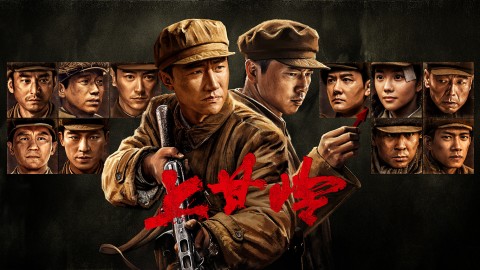Episode 22 recap: Chiang Kai-shek's power increased.
Zhou Enlai asked Chiang Kai-shek why he arbitrarily detained a large number of Communist Party members and whether it was he who initiated the mutiny. Mao Zedong believed that the current situation was extremely serious and they could not remain passive. The decision they make now will impact the survival of the Communist Party. Chiang Kai-shek told the students at the military academy that they should withdraw from the Communist Party in two days and be treated equally in the future.
Chiang Kai-shek pointed a pistol at Zhou Enlai, who felt that he had arbitrarily detained a large number of Communist Party members without reason. Chiang Kai-shek suspected that Wang Jingwei had been manipulated by someone and now wanted to seize his military power. Zhou Enlai reminded him that what he was doing was highly inappropriate. Chiang Kai-shek thanked him for the reminder but stated that the students from the Whampoa Military Academy, whom he considered as his own, would not be detained. He only wanted to ensure their safety. Before Zhou Enlai could say anything else, Chiang Kai-shek ordered his men to take Zhou Enlai away.
Zhou Enlai told him that the bigger the misunderstanding, the harder it would be to resolve in the future, and it would depend on how Chiang Kai-shek would handle the situation. However, Chiang Kai-shek refused to listen and insisted on his own course of action. Mao Zedong and a few others discussed rescuing Zhou Enlai from the military academy. Some people felt that this method was not appropriate, but Mao Zedong believed that Chiang Kai-shek's actions had already violated them.
Chiang Kai-shek's soldiers came to inform Zhou Enlai that he could leave. Zhou Enlai planned to confront Chiang Kai-shek and ask him what he intended to do. However, when he angrily walked into Chiang Kai-shek's office, it was empty.
Chiang Kai-shek told them that his actions had indeed been somewhat ill-considered, and he had already released the detained individuals. Chiang Kai-shek was afraid that Wang Jingwei might misunderstand him, as Wang Jingwei might already believe that he was rebelling.
Zhou Enlai met with Mao Zedong and others and informed them that the security outside had been lifted. Mao Zedong told everyone that their counterattack was not against cooperating with the Kuomintang but to punish Chiang Kai-shek. Chiang Kai-shek had summoned the Soviet envoy, and Mao Zedong told the diplomats that his decision would impact the survival of the Communist Party.
Chiang Kai-shek realized his mistake and took the initiative to write an apology letter to Wang Jingwei, but Wang Jingwei became very angry after reading it. He saw the strict measures mentioned in the letter and decided to let Chiang Kai-shek face the consequences of his actions.
Wang Jingwei gathered the members of the Military Commission, believing that Chiang Kai-shek's detention of comrades and the military academy personnel constituted a counter-revolutionary mutiny that must be severely punished.
The 3-2-0 Incident must be thoroughly investigated. Some people suggested that there might be a misunderstanding in this matter. Moscow's diplomat Ji Shanjia bid farewell to Wang Jingwei, who angrily sat down on a chair. In March 1926, Wang Jingwei went on leave abroad due to anger, and Tan Yancong acted as the acting Chairman of the Nationalist Party in Guangzhou.
Jiang Kai-shek held a meeting with the Huangpu Military Academy personnel, informing them that they had two days to consider, and those who wanted to withdraw from the Kuomintang could inform him. Jiang Xianyun was the first to stand up and declare his withdrawal, followed by others. Over two hundred and fifty comrades had already withdrawn from the Nationalist Party's Volunteer Army. Zhang Guotao asked Chen Duxiu if they could recruit these comrades for their own use.
Chen Duxiu told Zhang Guotao that sometimes he wondered if it was a mistake to send Dai Jitao and the others away. Zhang Guotao reassured him not to overthink it. Chen Duxiu believed that he couldn't shirk this responsibility and began coughing. Zhang Guotao quickly closed the window and lit the torch again.
Chen Duxiu felt that he had grown old, and if it were in the past, he would never have allowed Jiang Kai-shek to act so recklessly. Jiang Kai-shek put forward a series of proposals aimed at weakening the power of the Communist Party. Chen Duxiu instructed Zhang Guotao to go to Guangzhou the next day and inform the Guangdong District Committee to approve Jiang Kai-shek's proposal, saying that it was Chen Duxiu's intention. He told Zhang Guotao to bear all the blame.
Mao Zedong was very angry about this proposal. He asked Zhang Guotao about Chen Duxiu's opinion, and Zhang Guotao told them that Chen Duxiu asked each of them to sign and agree. Mao Zedong angrily wanted to leave, but Zhang Guotao blocked his way and insisted that Mao Zedong sign before leaving. Mao Zedong asked him to step aside.
He believed that Jiang Kai-shek had already gained abundant power and resources, and only he knew the truth behind Sun Yat-sen's final wishes. Jiang Kai-shek looked at his diary and burned a part of it. After the Zhongshan Ship Incident and the reorganization of party affairs, the Communist International and the CPC Central Committee repeatedly compromised, while Jiang Kai-shek greatly strengthened his military and political position, becoming the figure with the highest power in the south.
These events became crucial turning points in the development of the relationship between the Kuomintang and the Communist Party during the period of the Great Revolution.



Comments(Episode 22)